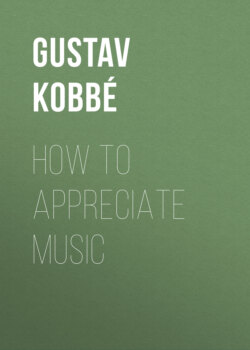Читать книгу How to Appreciate Music - Gustav Kobbé - Страница 29
На сайте Литреса книга снята с продажи.
What Wagner Learned from Bach.
ОглавлениеIf we bear in mind that counterpoint is the artistic combination of several themes, each of equal or nearly equal importance, and that Bach was the greatest master of the contrapuntal school and forms its climax, we can, with a little thought, appreciate what his service has been to modern music. When Wagner devised his system of leading motives it was not for the purpose of employing them singly, like labels tacked onto each character, thing or symbol in the drama, but of combining them, welding them together, when occasion arose, in order to give musical significance and expression to each and every dramatic situation as the 68 story unfolded itself. A shining example of this is found in that wonderful last scene of “Die Walküre,” the so-called Magic Fire Scene. Wotan has said farewell to Brünnhilde; has thrown her into a profound slumber upon the rock; has surrounded her with a circle of magic flame which none but a hero may penetrate to awaken and win her. How is this scene treated in the score? In the higher register of the orchestra crackles and sparkles the Magic Fire Motive, the Slumber Motive gently rising and falling with the flames; while the superb Siegfried Motive (signifying that the yet unborn Siegfried is the hero destined to break through the fiery circle) resounds in the brass, and there also is a suggestion of the tender strains with which Wotan bade Brünnhilde farewell. The welding together of these four motives into one glorious whole of the highest dramatic significance is Wagnerian counterpoint—science employed in the service of art and with thrilling effect. Another passage from Wagner, the closing episode in the “Meistersinger” Vorspiel, often is quoted to show Wagner’s skill in the use of counterpoint, although he employs it so spontaneously that few people stop to consider how scientific his musical structure is. W. J. Henderson, in his capital book, “The Orchestra and Orchestral Music,” relates that on one occasion a professional musician was engaged in a discussion of Wagner in the corridor of the Metropolitan Opera House, while inside the orchestra was playing this “Meistersinger” Vorspiel.
“It is a pity,” said this wise man, in a condescending manner, “but Wagner knows absolutely nothing about counterpoint.”
